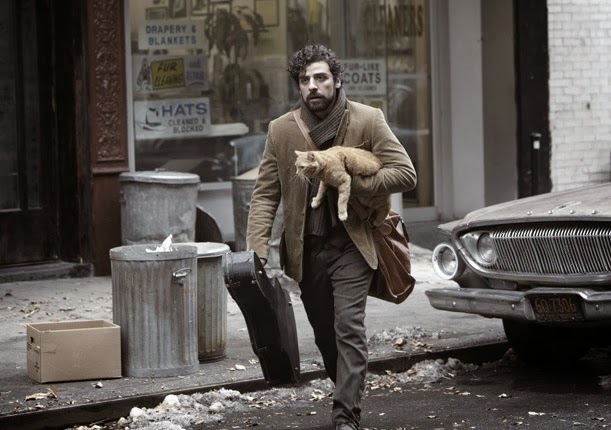10 Ocak 2014 Cuma
INSIDE LLEWYN DAVIS: The Film Babble Blog Review
Opening today at a indie art house near you:
INSIDE LLEWYN DAVIS
(Dirs. Ethan & Joen Coen, 2013)
We first meet the protagonist of the Coen brothers' 16th film performing at the Gaslight Cafe in the Greenwich Village of the early '60s. Bathed in white light, Oscar Isaacs' Llewyn Davis beautifully sings the traditional folk song “Hang Me, Oh Hang Me” on the same stage that artists such as Ramblin' Jack Elliot, Phil Ochs, Dave Van Ronk, and Bob Dylan cut their musical teeth.
The film sets out to capture the moment right before Dylan exploded on the scene; before the '60s really became the '60s and there were only faint whiffs of the revolution to come in the air.
Davis is caught in a shaky place in his crumbling career - his partner in a folk singing duo (Timlin and Davis) commited suicide, his solo album (also named “Inside Llewyn Davis”) isn't selling, and he has no fixed abode or even a winter coat. Davis also gets the news that he got his friend Jim's (Justin Timberlake) wife Jean (Carey Mulligan) pregnant so he has to come up with the money for an abortion.
Oh, and there's a cat he's saddled with because he accidentally let it loose from the last place he crashed.
Yep, it looks like Llewyn's life is getting dumped on in the same 'what does it all mean' manner that previous Coen character Minnesotan physics professor Larry Gobnik (Michael Stuhlbarg) had to contend with in their next to last film A SERIOUS MAN (2008).
At least Davis has his music to help get him through, but they seem to be less and less comfort. Especially as the music others are making seem to be catching on much more - in one scene a despondent Davis watches disgusted as a Gaslight audience starts singing along with Mulligan, Timberlake, and Stark Sands as a clean cut military man/folksinger on Hedy West's “500 Miles.”
Seeking new management in the form of F. Murray Abraham as Bud Grossman (based on Dylan manager Albert Grossman), Davis goes on a road trip with a spaced out beat poet (Garret Hedlund) and a surly jazz musician (John Goodman).
It's a gas to see Goodman back in a Coen brothers film after well over a decade (his last was O BROTHER, WHERE ART THOU? in 2000) amusingly berating Davis, his music, and cat (“Is that part of your act? Every time you play a C major he pukes a hairball?”) from the back seat.
The film takes some troubling turns which I won't spoil in this extended side trip, but nothing that I grew weary of like I'm hearing in some other critics' grumblings.
I'm incredibly biased both because I'm a big Coen brothers fan and can follow them down just about any tangent no matter how seemingly meaningless, and because I'm a huge fan of the era they're meticulously depicting here.
The Coens and cinematographer Bruno Delbonnel, who they previously worked with on their segment for the short film anthology PARIS JE T' AIME (2006), used the iconic album cover of The Freewheelin' Bob Dylan as an aesthetic reference point. The slightly faded blue and yellowish tint adds to the film authenticity in the exterior show covered street scenes, while the interior atmospheric lighting in the Gaslight bits made me feel like I was there at that historic time and place.
Despite the dead-on look of the film, and the wealth of great songs and performances throughout, INSIDE LLEWYN DAVIS may still be a tough sell to some folks because its title subject can be a bit of a dick who doesn't seem to be going anywhere. There is a definite humanity to him as he tries to do the right thing whether its dealing with the angry Mulligan's pregnancy or taking care of the cat, but neither approaches real redemption.
There's a lot to the fact that the film begins and ends with the same scene, but from different angles and a notably different addition to the soundtrack the second time around, involving Davis getting beaten up by a mysterious stranger in an alley behind the Gaslight.
INSIDE LLEWYN DAVIS may not be one of their all-time greats, but it's still one of the best films of year because the Coen brothers keenly capture the times right before they really went a-changin' and their week in the life of a failing troubadour premise explains precisely why somebody would want to beat up a folksinger.
More later...
Kaydol:
Kayıt Yorumları (Atom)

Hiç yorum yok:
Yorum Gönder